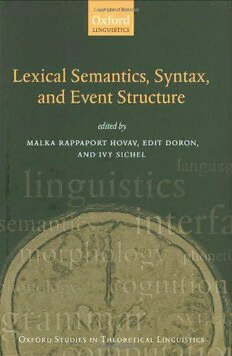
Lexical Semantics, Syntax, and Event Structure (Oxford Studies in Theoretical Linguistics) PDF
421 Pages·2010·1.581 MB·English
Most books are stored in the elastic cloud where traffic is expensive. For this reason, we have a limit on daily download.
Preview Lexical Semantics, Syntax, and Event Structure (Oxford Studies in Theoretical Linguistics)
Description:
This book focuses on the linguistic representation of temporality in the verbal domain and its interaction with the syntax and semantics of verbs, arguments, and modifiers. Leading scholars explore the division of labour between syntax, compositional semantics, and lexical semantics in the encoding of event structure, encompassing event participants and the temporal properties associated with events. They examine the interface between event structure and the systems with which it interacts, including the interface between event structure and the syntactic realization of arguments and modifiers. Deploying a variety of frameworks and theoretical perspectives they consider central issues and questions in the field, among them whether argument-structure is specified in the lexical entries of verbs or syntactically constructed so that syntactic position determines thematic status; whether the hierarchical structure evidenced in argument structure find parallels in sign language; should the relation between members of an alternation pair, such as the causative-inchoative alternation, be understood lexically or derivationally; and the role of syntactic category in determining the configuration of argument structure.
See more
The list of books you might like
Most books are stored in the elastic cloud where traffic is expensive. For this reason, we have a limit on daily download.
